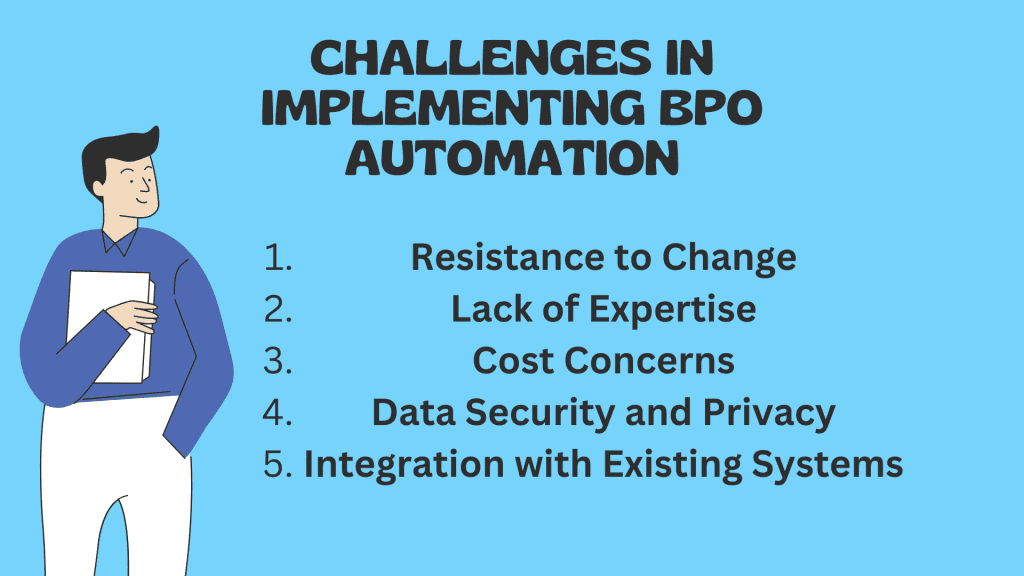In the rapidly evolving business landscape, Business Process Outsourcing (BPO) has become a cornerstone for companies looking to enhance efficiency and reduce costs. A key trend shaping the future of BPO is automation, leveraging technologies like Artificial Intelligence (AI), Robotic Process Automation (RPA), and Cloud Computing. This shift towards BPO Automation Trends is not just a fleeting change; it’s a significant leap towards operational excellence and digital transformation.
Automation in BPO, particularly through AI and RPA, streamlines complex processes, enabling quicker, more accurate decision-making and process optimization. For instance, AI in business process outsourcing transforms customer experience by employing data analytics and virtual assistants, offering personalized, efficient service. Meanwhile, robotic process automation BPO initiatives are revolutionizing how repetitive tasks are handled, freeing up human resources for more strategic planning and creative tasks.
The integration of cloud computing in BPO further enhances this transformation. It facilitates scalable, flexible solutions that adapt to changing market demands, a crucial aspect of adaptive BPO solutions. Machine learning in BPO, part of this technological integration, allows for continuous improvement and learning from data patterns, enhancing both efficiency and effectiveness.
This movement towards intelligent automation BPO is also driving cost reduction strategies in BPO, as automation can significantly lower operational costs while improving service quality. The future of BPO services is therefore not just about outsourcing tasks but transforming them through technology advancements and industry innovations.
BPO automation technologies are not just reshaping current practices; they are paving the way for future trends in the BPO sector. From AI-driven BPO solutions 2023 to emerging BPO tech companies, the landscape is rapidly evolving, offering new opportunities for growth and innovation.
The Evolution of BPO Automation
The landscape of Business Process Outsourcing (BPO) has undergone a dramatic transformation, marked by the advent and integration of various technological advancements. The historical journey from manual processes to the first steps in automation laid the foundation for today’s BPO Automation Trends, reshaping the industry in profound ways.
Technology’s Role in Transforming BPO Operations
Initially, BPO operations were heavily reliant on manual processes, often leading to inefficiencies and errors. The introduction of Automation and Artificial Intelligence marked a significant turning point, enabling businesses to streamline operations and enhance accuracy. Robotic Process Automation (RPA) and Machine Learning emerged as pivotal technologies, automating routine tasks and learning from data patterns to optimize processes.
Impact of Cloud Computing and Digital Transformation
Cloud Computing revolutionized BPO by offering scalable, flexible solutions that reduced infrastructure costs and increased accessibility. This digital transformation facilitated the seamless integration of various technologies, such as AI and RPA, into BPO operations, driving Process Optimization and Operational Excellence.
Advancements in Machine Learning and AI
Machine Learning in BPO has played a crucial role in analyzing vast amounts of data, leading to more informed decisions and predictive analytics. AI’s influence extends to Virtual Assistants, which have significantly improved Customer Experience by providing timely and personalized support.
Strategic Planning and Operational Excellence
The evolution of BPO has necessitated a shift in Strategic Planning, with a focus on leveraging Technology Advancements and Industry Innovations to achieve Operational Excellence. This includes integrating intelligent automation BPO systems that enhance efficiency and effectiveness.
Customer Experience and Data Analytics
BPO Automation Trends have greatly influenced Customer Experience, offering more personalized and efficient services. Data Analytics in BPO provides valuable insights into customer behaviour and preferences, allowing businesses to tailor their services accordingly.
Current Trends in BPO Automation
Current trends in Business Process Outsourcing (BPO) automation are rapidly evolving, driven by groundbreaking technologies such as Artificial Intelligence (AI), Machine Learning, and Robotic Process Automation (RPA). These advancements are reshaping the landscape of BPO automation trends, offering unprecedented opportunities for process optimization, operational excellence, and enhanced customer experience.
AI and Machine Learning in BPO: AI and machine learning are at the forefront of BPO automation trends, enabling businesses to analyze vast amounts of data swiftly and accurately. This facilitates better decision-making and more efficient processes. For instance, AI in business process outsourcing is increasingly used for predictive analytics, helping companies anticipate customer needs and preferences.
Robotic Process Automation (RPA): RPA has become a cornerstone in BPO automation technologies. It automates repetitive tasks, leading to significant time and cost savings. Robotic process automation in BPO enhances efficiency, allowing employees to focus on more strategic tasks. Companies leveraging RPA witness substantial improvements in process accuracy and speed, contributing to overall operational excellence.
Cloud Computing and BPO: Cloud computing in BPO offers scalable and flexible solutions, facilitating BPO digital transformation. It enables businesses to access advanced BPO automation tools without significant upfront investments, thereby supporting cost-reduction strategies in BPO. Cloud-based BPO strategies are particularly advantageous for small business BPO automation trends, offering them a competitive edge.
Digital Transformation in BPO: BPO digital transformation is integral to adapting to the evolving market demands. It encompasses the integration of AI, RPA, and cloud computing, leading to a more agile and responsive BPO model. This transformation is pivotal in driving BPO industry innovations and ensuring sustainable BPO practices.
Customer Experience and Data Analytics: Enhancing customer experience is a key focus in BPO automation trends. Through data analytics in BPO, companies can glean insights from customer interactions, leading to more personalized and effective services. Virtual assistants in BPO, powered by AI, are improving customer interactions, making them more efficient and satisfactory.
Operational Excellence and Process Optimization: Achieving operational excellence through process optimization in BPO is a significant trend. BPO efficiency improvement is seen through the deployment of intelligent automation BPO tools, which streamline workflows and reduce errors. This leads to a more robust and efficient operational model.
Strategic Planning and Market Growth: Strategic planning in BPO is crucial for aligning automation technologies with business goals. The BPO market growth is increasingly influenced by how effectively companies integrate these technologies into their strategic planning.
Challenges and Future Outlook: While the benefits of BPO automation are clear, challenges such as adapting to new technologies and ensuring seamless integration remain. The future of BPO services, however, looks promising, with AI-driven BPO solutions in 2023 and beyond set to revolutionize the sector.
Challenges and Solutions in Implementing Automation
In the dynamic landscape of Business Process Outsourcing (BPO), embracing automation is no longer a choice but a necessity. The integration of ‘BPO Automation Trends’ has become pivotal in enhancing efficiency, reducing costs, and improving customer experiences. However, BPOs often encounter various challenges in adopting these new technologies. Understanding these obstacles and strategizing effective solutions is crucial for the successful implementation of automation in BPOs.

Challenges in Implementing BPO Automation
- Resistance to Change: A common hurdle is organizational resistance to change. Employees often fear that automation technologies like Artificial Intelligence (AI) and Robotic Process Automation (RPA) might replace their jobs. This fear can lead to a lack of cooperation in embracing new technologies.
- Lack of Expertise: The introduction of technologies like Machine Learning and Cloud Computing requires specific skills. Many BPOs face a skills gap, struggling to find or develop talent that can effectively implement and manage these advanced systems.
- Cost Concerns: Investing in new technologies like digital transformation tools and AI-driven solutions can be expensive. Small and mid-sized BPOs particularly face budget constraints, making it challenging to adopt these advanced systems.
- Data Security and Privacy: With the adoption of cloud-based technologies and data analytics, BPOs are concerned about data security and privacy. Ensuring the safety of sensitive information while utilizing these technologies is a significant challenge.
- Integration with Existing Systems: Integrating new technologies like virtual assistants and intelligent automation solutions with existing systems can be complex. Compatibility issues and the fear of disrupting current operations are common concerns.
Strategies to Overcome These Challenges
- Strategic Planning and Employee Engagement: To overcome resistance, BPOs need to engage employees in the automation process. This involves transparent communication about the benefits of automation and how it can enhance their work rather than replace it.
- Investing in Training and Development: Addressing the skills gap requires a focus on training and development. Outsourcing training or developing in-house programs to upskill employees in areas like AI and cloud computing is essential.
- Cost-effective Solutions and Partnerships: For budget concerns, BPOs can explore affordable BPO automation tools and partnerships with tech start-ups. Leveraging cost reduction strategies in BPO through these collaborations can make technology adoption more feasible.
- Robust Data Security Measures: Implementing stringent data security protocols and using secure cloud computing services can address privacy concerns. Regular audits and compliance with data protection regulations are crucial.
- Phased Integration and Testing: To ensure smooth integration, BPOs should adopt a phased approach. Testing new systems in stages and ensuring compatibility with existing processes can mitigate operational risks.
Conclusion
BPO Automation Trends are revolutionizing Business Process Outsourcing (BPO), driving the industry towards operational excellence with advancements in Automation, Artificial Intelligence (AI), and Robotic Process Automation (RPA). These technologies streamline outsourcing, enhancing efficiency and customer experience. Automation plays a crucial role in the Digital Transformation of BPOs, with Cloud Computing and Machine Learning being key enablers.
The integration of BPO automation technologies, such as AI in business process outsourcing and cloud computing in BPO, fosters Process Optimization. This shift is evident in the emergence of AI-driven BPO solutions in 2023, highlighting the industry’s adaptability. Robotic Process Automation BPO is particularly impactful, offering precision and speed in routine tasks, leading to significant cost reduction strategies in BPO.
BPO digital transformation is not just about technology; it’s about reshaping the BPO landscape to offer adaptive BPO solutions. For instance, BPO tech advancements like virtual assistants in BPO are transforming customer interactions, making them more personalized and efficient. BPO industry innovations are increasingly focusing on enhancing the customer experience BPO trends.
Moreover, the future of BPO services is being shaped by intelligent automation BPO, which combines AI, machine learning in BPO, and analytics. Data analytics in BPO provides insights for better strategic planning and decision-making, crucial for maintaining BPO operational excellence.
These trends indicate a robust growth trajectory for the BPO sector, with a focus on sustainable BPO practices and innovative BPO business models. BPO service evolution is poised to leverage technology for not just cost efficiency but also for offering enriched, data-driven customer experiences.
FAQs
What is BPO automation?
BPO automation refers to the integration of technology, particularly software tools and applications, into Business Process Outsourcing (BPO) operations. This integration aims to streamline, optimize, and improve the efficiency of various outsourced business processes like customer service, data entry, and back-office tasks. Automation technologies often include artificial intelligence, robotic process automation, and machine learning algorithms.
How is AI impacting BPO services?
AI is significantly transforming BPO services by enhancing efficiency, accuracy, and speed in processing tasks. It aids in handling complex data analysis, provides intelligent customer service through chatbots, and automates routine tasks. This leads to cost reduction, and better customer experiences, and allows human employees to focus on more strategic, less repetitive work.
What are the latest trends in BPO automation?
The latest trends in BPO automation include the increased use of AI and machine learning for predictive analytics, the deployment of robotic process automation (RPA) for repetitive tasks, the adoption of cloud-based BPO services for scalability and flexibility, and a focus on cybersecurity and compliance automation to protect sensitive data.
How does robotic process automation affect BPO?
Robotic Process Automation (RPA) significantly impacts BPO by automating routine, rule-based tasks. This results in increased efficiency, reduced human error, faster processing times, and cost savings. RPA enables BPO firms to handle higher volumes of work with consistent quality, freeing human employees to focus on more complex and value-adding activities.
What benefits does automation bring to BPO?
Automation in BPO offers several benefits, including improved efficiency and productivity, cost savings from reduced manual labor, higher accuracy and consistency in task execution, enhanced scalability, and the ability to provide 24/7 service. It also enables BPOs to offer more sophisticated services like data analytics and intelligent customer support.
How is digital transformation shaping BPO?
Digital transformation is reshaping BPO by introducing advanced technologies like AI, RPA, and cloud computing. These technologies enhance operational efficiency, offer better data insights, improve customer experiences, and create new service offerings. Digital transformation also facilitates remote and flexible working models, expanding the global reach of BPO services.
What role does machine learning play in BPO?
Machine learning in BPO aids in analyzing large data sets to derive insights, improve decision-making, and predict customer behavior. It enhances process automation, improves accuracy in tasks like fraud detection, and personalizes customer interactions. Machine learning algorithms continuously learn and adapt, improving the effectiveness of BPO services over time.
How can BPOs optimize their processes using technology?
BPOs can optimize their processes using technology by implementing AI for intelligent data processing and customer interactions, using RPA for automating repetitive tasks, employing cloud computing for scalability and flexibility, and leveraging analytics for actionable insights and improved decision-making. These technologies streamline operations and enhance service delivery.
What are the challenges of automating BPO services?
The challenges of automating BPO services include the high initial cost of implementing automation technologies, the complexity of integrating new systems with existing ones, managing change and training employees, ensuring data security and privacy, and the risk of technology becoming obsolete quickly.
What future innovations are expected in the BPO industry?
Future innovations in the BPO industry are expected to include the increased integration of AI and advanced analytics for deeper insights and decision-making, the adoption of blockchain for secure and transparent transactions, the expansion of RPA to more complex processes, and the use of virtual and augmented reality for training and customer service enhancements. Additionally, there will likely be a greater emphasis on sustainability and ethical sourcing in BPO operations.






